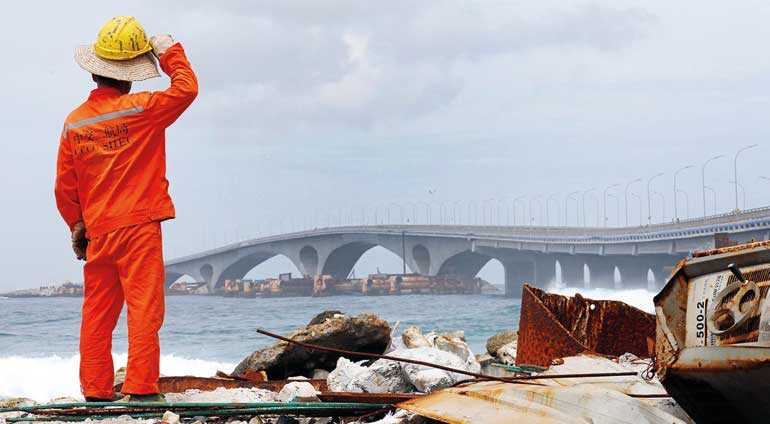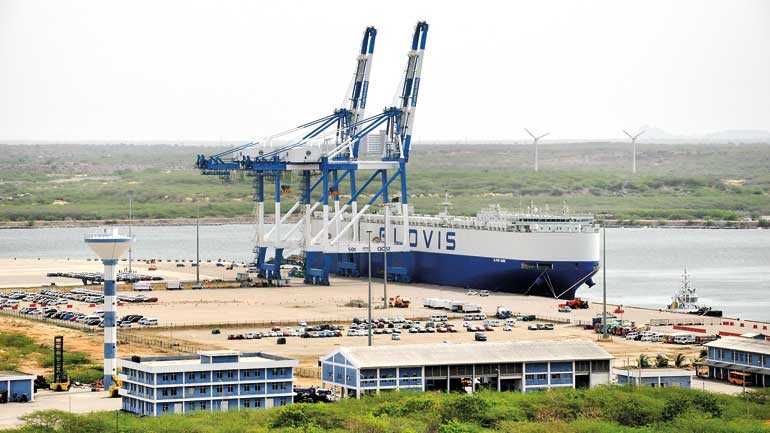Saturday Feb 21, 2026
Saturday Feb 21, 2026
Monday, 26 November 2018 01:12 - - {{hitsCtrl.values.hits}}

Allow me to make two points at the start. Firstly, this is going to be a longish piece so please make time to read through, those of who you are interested. Secondly, I’m fully aware that I’ve got my metaphors completely tangled up and that I need to untangle them. So let me parse the heading down to its component parts.
The siren song of China
In Greek mythology, the sirens were dangerous creatures who lured sailors and their ships to rocky coasts to wreck the ship and lose their lives. The siren songs, it is said, were so achingly beautiful that even while the sailors and captains were aware of the dangers, they could not help but follow the song, destroying the ship and themselves. 
Many developing countries today have been enthralled and captivated by the siren song of China and its promise of large-scale infrastructure projects and untold wealth for the leaders and their ilk. The song is so captivating and the promised wealth so alluring that projects get signed up without proper due diligence.
In the end, the country and its economy get wrecked on rocky shores and most interestingly the leaders loose the mantle of their power, as the citizens reject the chosen strategy. While it is played all across the world, the song is that much louder and appealing in the less-developed, resource-deprived countries of the world.
Without looking to insult the depth of knowledge of the reader, let me just point to what’s been happening here in the Maldives and in the neighbouring countries of Sri Lanka, Pakistan and Malaysia.
The siren song is, as in legends, hypnotic and captivating: Follow us into this hall of mirrors where your naked ambitions are laid bare to us, and we will anoint you in wealth and power. Enable you to return to your country with big, nay mammoth like infrastructure projects that will never be funded, let alone seriously received by the developed world and their rule-bound institutions. Come be a part of us, we have the means and the willingness to make your wildest ambitions come true, make you rich beyond your imagination and make you strong and untouchable in your country and in the international arena. (At least until the next time the citizens are allowed near a ballot box.)
The Macbeths who keep falling for it
Macbeth was of course the brave and courageous Scottish warrior. Loyal to a fault to his liege King Duncan, he had proven his loyalty on the battlefield. But, once the whisperers promised ascendancy to the throne and the riches that were on offer, he was consumed by ambition. Encouraged by Lady Macbeth to overcome his reticence, Macbeth went on a murder spree, killing King Duncan and crowning himself King, albeit for a brief, and murderous period.
In order to hold on to the tiger’s tail, Macbeth must commit more and more treacherous acts and soon transforms himself into a full tyrannical ruler who has no respect to the customs and laws of the country. Citizens fight against citizens, and turmoil ensues within the country. The determination to hold onto power finally take him into the depths of madness where his cruelty and wild abandon knew no bounds. In the end, Macbeth is finally killed by Macduff; his former friend and brother in arms. Now if that sounds familiar it is because Macbeth’s tragedy is played large across many nations, where leaders who were once thought to be heroic and honest, enter into a Faustian bargain for power and riches, get ensnared by the siren songs and consumed by madness and guilt and is finally deposed. It is of course testimony to the staying power of the Bard who laid bare the many weaknesses of the human psyche in so many of his works.
The citizens who reject them both
Odysseus, the legendary Greek God, when crossing the coasts where the sirens sang their songs, is famous for having his sailors plug their ears to prevent them from hearing the siren song. He also got them to tie him to the mast, lest he succumb to the song of the sirens.
We have repeatedly seen the Macbeths of this world falling for the alluring and enchanting siren song of China. It promises the means for the wealth required for the power to trespass on the rights of the citizens and trample on the checks and balances of the system. It is driven by avarice and fuelled by a thirst for power without boundaries. That much is evident and perhaps understandable. (Perhaps. Let me be completely clear, understanding the motive, comprehending what’s at play, is not and should not be understood as sanctioning the act or an endorsement of any sort.)
But why do the citizens of the countries continue to reject both the siren song and its promises? Why do the citizens here in the Maldives, in Sri Lanka, Pakistan and Malaysia, gave their thumbs down to this development model? A model that, like a magician conjuring a rabbit out of a top hat, quite suddenly brings forth expensive and mammoth infrastructure into existence out of thin air.
"The aftereffects of the Chinese siren song and the thirst for power of the Macbeths of the developing world continue to play out even as the primary actors change. The aftermath is bloody and disastrous. But by the time, the citizens come to realize this, the ship of the state is wrecked on rocky shores and the sailors and their wealth are scattered in high winds and stormy seas"
As we shed our childhood fantasies and mature into an adult, one thing we’ve learnt is that there’s no magic. There’s no suspending the laws of nature; and there’s no suspending the laws of economics either. Let’s peek through the smokes and mirrors and witness, and thus understand how such enormous projects are so easily accomplished.
The developed countries of the world, bar China and perhaps Russia to some extent, today practice free market economics, commonly referred to as capitalism. A development model where, in the main, the state shies away from direct economic activity and practices non-interference with the means of production, but instead focusses on regulation and oversight. Let me emphasize that this is a generic statement and there’s many examples across the world of many developed country where states engage in commercial activities, often in direct competition with the private sector. Exceptions that prove the rule.
China, for a large part, practices a model that is known as ‘state capitalism’. The Chinese state owns in whole, or manifestly controls the biggest business in China, some of which are in fact the biggest in the world. Chinese banks rank the four biggest banks in the world and they are all state owned. All of the biggest contracting companies in China are state-owned, of which some rank among the big 10 in the world. Even when the shareholders are not actually the state, the nature of governance ensures that management and owners know exactly the right road to travel on.

In contrast the biggest companies in the developed world are private. Their interests are not always aligned to the interest of the state. In fact, we are all aware of the many unsuccessful attempts by governments to get Apple to open an iPhone, hold Facebook accountable and WhatsApp more responsible.
All of which mean that Chinese companies can be and are repeatedly deployed by the state to promote the interests of the state. And we do not here, need to take a detour to explaining the importance of the One Belt One Road Project of the People’s Republic of China. Costing a trillion dollars by some estimates, it is the premium and indeed the primary project of the Chinese state and therefore, unsurprisingly of priority to Chinese companies. State companies not only undertake the major Chinese infrastructure projects, they are also often the source of funding for many of the projects.
Western companies, at least today, are not quite that enthusiastic to jump into the cesspool of national politics. They tend not to pump private equity into low ROI, investment heavy projects mostly because they know of too many examples where such projects have suffered ‘death by a thousand cuts’ as political reality shift on the ground.
So how does this model of state capitalism manage to motivate the Macbeths of the developing world? By of course, of making it worth their while to sign up for such projects even while knowing fully well, that they are signing up to projects that are way too highly priced and often way to low on the list of national priorities. The number of Chinese funded projects that get cancelled or postponed when governments change, as they inevitably do, is perhaps the best testimony to the fact that there’s ‘something rotten in the state of Denmark’.
So why do the citizens of the world keep on denying the voice of the charmers and rejecting such governments at the ballot box? There can be I think, two alternative answers to the riddle-the naïve and the sceptical.
The naïve response may be seen as rejection of the siren song because of moral and ethical considerations. In this explanation citizens are moral and act ethically. They cannot be simply bought and refuse to follow the enchanting songs of the sirens. They only vote for what’s best for the state and therefore keep the ship of state away from rocky coasts.
In contrast, the sceptical version can be stated in economic and therefore perhaps more mundane reasons. No state can practically buy a whole country. There’s not enough wealth to pay every citizen the same dividends offered to the ruling class. There’s never enough wealth to raise all the citizens to the same level of opulence and fabulous wealth offered to the Macbeths and their immediate underlings.
"Regardless of the rhyme or reason, there’s much to be absorbed, lessons to be learnt. As said earlier, with the shift of power, incoming governments attempt to get out of contracts signed with the blood of the nation. Not all governments, are of course able to successfully terminate all such projects, leading to unhappy and unsatisfactory compromises. The attempt to re-negotiate the Hambantota deal, and the eventual compromise of the unhappy 99-year lease is just one of the best examples"
Besides, wealth is after all a relative term. Keeping up with the Joneses is a universal concept. One always compares oneself to the wealth of others. Even if the per capita income of the whole country is doubled and then doubled again, the Lorenz curve is never a 45% degree straight line.
Thus, even while the siren song promises wealth and richness to many, human greed ensures that such ill-gotten wealth is never equally distributed. Macbeth become King and enjoys all the benefits while the henchmen who sweat and tire themselves to keep the Hamlets in power, get scrapings off the supper table, which they willingly consume, but are never happy about.
The citizens, not being able to demand any, get even less. They only get a whiff of the richness of the supper table and the meals being consumed. They get to see the richness and affluence of the BMW driving, multi-apartmented, Rolex’d leaders and seethe for what they too, want for themselves and their offspring. Envy and jealousy forces them to reject those who live so opulently and dine so richly every night.
The underlings too seethe and sharpen their knives, because they have seen and tasted the richness and want a seat at the supper table. They both seethe and wait for an opportunity to turn the tables. And that’s why, the sceptical alternative says, the citizens reject the siren song of China.
Which of the alternative sound truer, has of course, much to say about the reader as well. Can I say that again? Which of the alternative sound truer, has of course, much to say about the reader as well. Or maybe it is a mixture, a combination of the naïve and the sceptical that accounts for the repeated rejection of the siren song.
The aftermath
Regardless of the rhyme or reason, there’s much to be absorbed, lessons to be learnt. As said earlier, with the shift of power, incoming governments attempt to get out of contracts signed with the blood of the nation. Not all governments, are of course able to successfully terminate all such projects, leading to unhappy and unsatisfactory compromises. The attempt to re-negotiate the Hambantota deal, and the eventual compromise of the unhappy 99-year lease is just one of the best examples.
It is also important to understand that the Faustian deal to buy the soul of developing nations is not a blood sport, or a distraction. It is part of the One Belt One Road project to ensure safe passage of essential imports and exports of the second biggest economy in the World. Apart from being an economic necessity, and because of the economic necessity, it is also an issue of national security for the Chinese.
Meanwhile, the geopolitics of the Indian Ocean also dictate that the axis of western powers, including India, will always attempt to mute the song and depose of the Macbeths. Not by proclaiming their intentions loudly but by using other pretexts like human rights, religious freedom and other such soft terms.
And so, once the siren song is heard and the course of the ship altered, there’s no clean getting away from the mess that ensues. The effects pervade the economy for the long term, sinks into the ground and taints all that grows on its soil. Even if Macbeths are deposed of at polls, it’s not possible to break the Faustian bargain. The taste lingers, the desire to return at any cost persists and turmoil results. For those who ‘on honey-dew hath fed, and drunk the milk of Paradise’, there’s no getting away from it.
And therefore, the aftermath is messy and while there are always local issues with local actors strutting the stage, the many sub plots of the high drama being played in Sri Lankan politics today, for a large part, have its roots in this dynamic.
The aftereffects of the Chinese siren song and the thirst for power of the Macbeths of the developing world continue to play out even as the primary actors change. The aftermath is bloody and disastrous. But by the time, the citizens come to realize this, the ship of the state is wrecked on rocky shores and the sailors and their wealth are scattered in high winds and stormy seas.